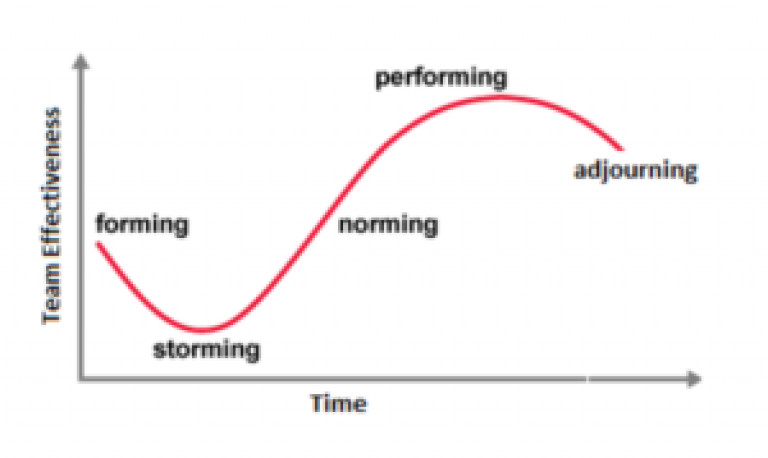Discussion: Group Process and formation
Discussion: Group Process and stages of formation
Discussion: Group Process and stages of formation
Permalink: https://collepals.com/discussion-group…ges-of-formation/
In 1965, Bruce Tuckman proposed five stages of team development: Forming, Storming, Norming, Performing and Adjourning. This model describes five stages that every team goes through during its development. By understanding this model, it can help take away the unpredictability of forming teams and allow you, and your team, a better chance at team success.

Stage 1. Forming
This is the first stage of a team coming together; a group of people have come together to accomplish a shared purpose and the results can be unpredictable. At the beginning, anxiety is high, people are uncertain and they are overly polite and pleasant. This stage can last a while as people get to know each other and the teams success at this stage depends on their familiarity with each others work styles, their experience with prior teams and clarity of assigned tasks.
As the team leader, you should:
- Play a dominant role at this stage to help your employees recognise whos the leader
- Establish clear goals and objective for the whole team, and each individual
- Allow for open communication so that your team members can get to know each other
Stage 2. Storming
This is the hardest stage in the development of any team, and undoubtedly your team will be at its least effective here. This stage is marked by conflict and competition as personalities and working styles begin to evolve and the members of the team are unfamiliar on how to communicate with each other. Teams may also disagree on goals and subgroups or cliques may form. Many teams often fail at this stage so it is important to reduce and address this conflict so that problems do not occur later on.
As the leader, you should:
- Be specific and clarify goals
- Remain positive
- Ensure that you don’t overload the members with work
- Ensure that you support your team members, and ensure that they support each other; building trust is crucial at this stage.
- Explain the forming, storming, norming, performing and adjourning model to your team so they know what to expect.
- Use personality tests, such as the ones outlined in the article, to aid the understanding of each others personality and work styles.
 The effectiveness of the team at each stage
The effectiveness of the team at each stage
Stage 3: Norming
The team will begin to resolve their interpersonal differences, appreciate others and form working relationships. There is a sense of cohesion and unity and this allows for the team to work functionally together towards the end goal. At this point, performance increase as the team begins to cooperate and focus on the goals.
As the leader, you should:
- Provide feedback, both positive and negative.
- Step back and allow your team to take responsibility towards the goal; you could even begin to work on other tasks – perhaps even forming new teams!
- Incorporate team building exercises to strengthen the unity and trust within the team.
Stage 4: Performing
At this point, relationships are formed and there is a clear and stable structure. The team is mature, organised and has a sense of consensus and cooperation. Problems and conflict, of course, do still arise, but they are dealt with effectively. The prime focus of the team is on problem solving and meeting goals; effectiveness is at its peak.
As the leader, you should: *Delegate work evenly and fairly *Focus on the development of individual team members *Allow people to join, or leave, as it won’t affect group performance.
Stage 5: Adjourning
This is the point where the project comes to an end and the team separates and goes their separate ways. Some team members may find this hard because they liked the routine of the group, have made close friendships or if the future, after leaving this team, looks bleak and unpromising.
In a 2- to 3-page paper, address the following:
- Explain the group’s processes and stage of formation.
- Explain curative factors that occurred in the group. Include how these factors might impact client progress.
- Explain intragroup conflict that occurred and recommend strategies for managing the conflict. Support your recommendations with evidence-based literature.
- Please include a title page, introduction page, body, summary and reference page.
Collepals.com Plagiarism Free Papers
Are you looking for custom essay writing service or even dissertation writing services? Just request for our write my paper service, and we'll match you with the best essay writer in your subject! With an exceptional team of professional academic experts in a wide range of subjects, we can guarantee you an unrivaled quality of custom-written papers.
Get ZERO PLAGIARISM, HUMAN WRITTEN ESSAYS
Why Hire Collepals.com writers to do your paper?
Quality- We are experienced and have access to ample research materials.
We write plagiarism Free Content
Confidential- We never share or sell your personal information to third parties.
Support-Chat with us today! We are always waiting to answer all your questions.
